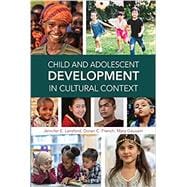Human development doesn’t occur in a vacuum. Rather, it is deeply rooted in, and affected by, culture.
This textbook examines how culture affects several domains of development, including cognition, emotion, sociolinguistics, peer relationships, family relationships, and more.
The chapters highlight differences between “WEIRD” cultures (Western, educated, and from industrialized, rich, and democratic countries) and non-WEIRD cultures, as well as differences with respect to gender, race/ethnicity, socioeconomic status, and other identity markers.
Each chapter draws upon a large research base and highlights specific studies to engage students, illustrate key points, and convey the role of empirical research in psychology. As a result, students will learn that the development of behavior, values, social relationships, ways of seeing the world, language, and thought processes cannot be understood separate from culture.








